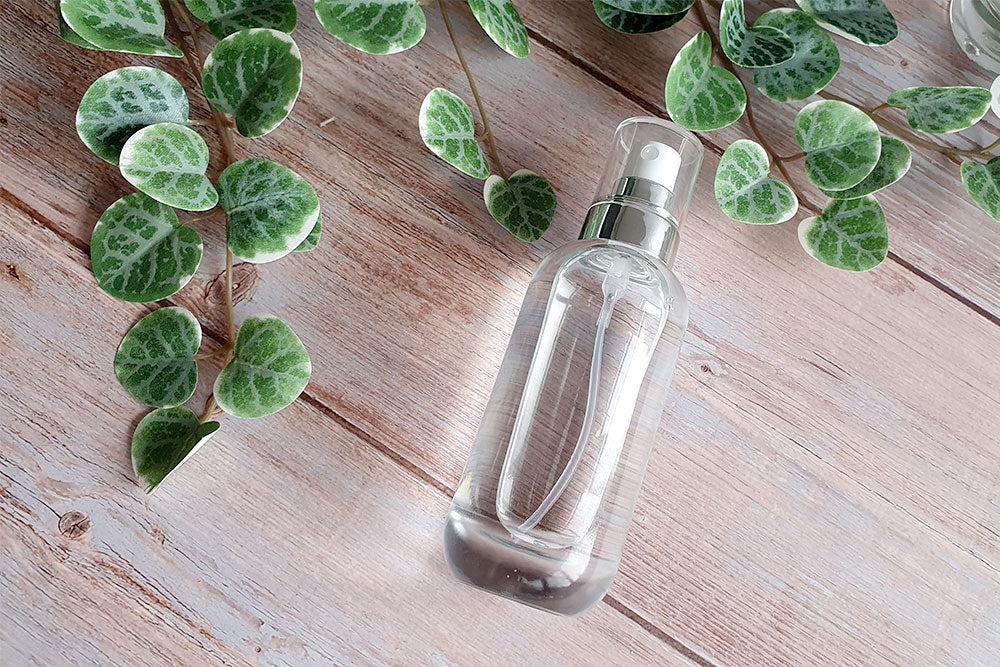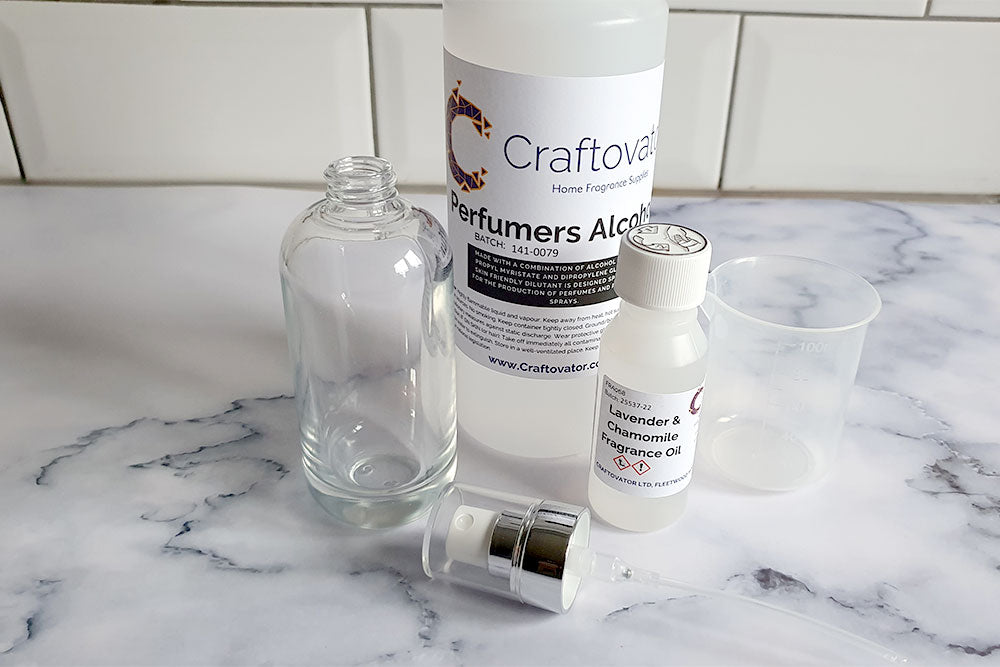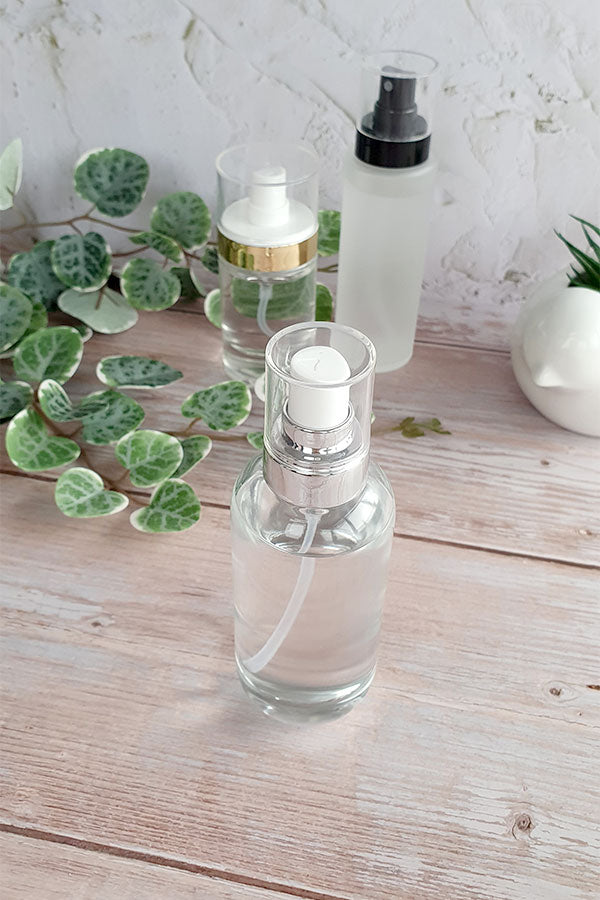It’s so simple to refresh your home fabrics in seconds with a linen spray and with our tutorial, you’ll see how incredibly easy they are to make yourself at home. Whether you are looking for a better night’s sleep, you want to keep those pet beds smelling fresh or you simply want to create a gorgeous first impression with visiting guests, making a linen spray couldn’t be simpler.

Save your money on the hefty high-street prices and jump into our step-by-step guide on how to make your own lavender and chamomile scented linen spray with just two ingredients!
Our video tutorial is perfect for beginners but keep scrolling for written instructions with pictures and to find out why you’d use a linen spray, what ingredients you can use, how to personalise your spray according to your needs and some suggestions of our favourite scents to use for linen sprays.
Important Note: This tutorial is meant for personal use only and as such, we’ve used Perfumers Alcohol which gives excellent results. If you wanted to sell your linen sprays using this base, as PA is a hazardous base, you would need to have a 3rd party company professionally calculate a CLP label template for you. This is not something we provide at Craftovator.
The Perfumer’s Alcohol can be swapped out with Cyclomethicone which is a non-hazardous base and as such, you can use the non-hazardous CLP template up to 10% for our fragrance oils. However, there will be increased risk of staining using this base so always test your linen spray in a discreet area of fabric first.
How to make Lavender & Chamomile Linen Spray
Difficulty: Beginner
Makes: 1 x 100ml Spray Bottle
Ingredients, Materials and Equipment

- 95ml Perfumers Alcohol
- 5ml Lavender & Chamomile fragrance oil
- 1x 100ml Rounded Clear Glass Screw Bottle
- 1x Glossy Silver Spray Pump & Cover
- 100ml measuring cup
- Small funnel (optional)
- Kitchen roll to protect your work surface
- Nitrile gloves (or similar protective gloves) and an apron. We’d also highly recommend the use of a chemical mask
Top tip: Before starting, make sure your work surface is covered and you’re wearing the correct PPE as stated in the materials needed above. This is to avoid skin/respiratory irritation from the fragrance oil and to protect your clothes from any splashes.
Step 1 – Measure out the base

Take the measuring cup and measure out 95ml of Perfumers Alcohol.

Carefully pour this into your spray bottle either straight from the cup or via the funnel.
Step 2 – Add the Fragrance Oil

Using the same measuring cup, measure out 5ml of Lavender & Chamomile fragrance oil.

Once again, pour this into the bottle either straight from the cup or via the funnel.
Step 3 – Combine the Ingredients

Once the base and fragrance oil are in the spray bottle, attach the pump and put the lid on.

Shake for around 90 seconds to allow the fragrance oil to bind with the base.
Step 4 – Using Your Room Spray
Your room spray is now made and ready to use. Simply position the spray nozzle towards your chosen linens and spritz from around 20-30cm away. You don’t need to use a lot.
The wonderful fragrance will scent your room and linens for hours.
Pro Tip: For best results we advise leaving the made up room spray open for 24-72 hours to allow the alcohol smell to die down from the base. This will also aid in the fragrance oil binding fully with the base.
What’s the difference between linen spray and room spray?

Linen spray is a clear, stainless liquid stored in a spray bottle and is designed to be spritzed over bed linens and soft furnishings to refresh and update their scent.
Whilst they are similar, a room spray is essentially an air freshener and is usually sprayed towards the centre of a room, not directly onto fabrics.
What ingredients do you need to make a linen spray?

Making a linen spray is really simple, in most instances just 2 ingredients are needed – a base and fragrance or essential oil! Here are a few options of bases and fragrance oils you might want to try when making your own linen spray at home:
Cyclomethicone (Base)
Cyclomethicone base is a great addition to linen sprays as it evaporates easily and has great scent projection. Plus, its safe for skin and won’t cause any irritation should it come into contact with you. Just be sure to test on a hidden area of the fabric first before continuing use as it may cause staining to very delicate fabrics!
Perfumer’s Alcohol (Base)
Perfumers Alcohol is also a great linen spray base and possibly the most widely used base. The alcohol evaporates quickly leaving only the beautiful fragrance behind. It won’t cause any staining to fabrics but may increase some fabrics flammability slightly due to the presence of the alcohol, so just bare this in mind.
Witch Hazel (Base)
Witch Hazel is a preference for some people instead of an alcohol base as it is skin friendly and has other uses such as being used for facial toners.
Fragrance Oils or Essential Oils
To scent your base, you’ll want to use either essential oils or fragrance oils. Essential oils are widely recommended for use in linen sprays due to them being much safer when coming into contact with the skin. However, you can absolutely use fragrance oils safely and you’ll find a wider choice of scents available.
If you are using your room sprays directly on bedding, we’d recommend opting for an essential oil at night time to minimise the risk of irritation on facial skin. During the day or on other soft furnishings and fabrics, feel free to use either essential or fragrance oils.
Distilled Water (Additive)
Distilled water can be used as an additive to help dilute essential oils. Whilst this is entirely optional, if you’re opting to use essential oils, it may result in a much clearer spray. Simply add a small % of the distilled water to the base and oil.
How much fragrance or essential oil can you use in linen sprays?
When making linen sprays its always best to check the oils IFRA document beforehand. Generally, a 5% oil to 95% base concentrate is recommended due to the oils natural strength. For linen sprays the IFRA category is 10A. If this category states 5% or more, then the oil can be used in a linen spray but we would advise only using a maximum of 5% regardless.
Some things to consider when making linen spray
- Spray the mixture onto a piece of cloth such as a tea towel or old t-shirt and wait a few minutes to check for any staining. It is unlikely, but always smart to check before going ahead and spraying onto other furnishings.
- Don’t add any extra oils to your linen spray such as carrier oils like jojoba as these will leave a residue and possibly stain your fabrics.
- If using essential oils, store your linen spray in an opaque or dark bottle (amber ones are great for these types of products) to stop the oil inside from spoiling too quickly. For fragrance oils, our range of glass perfume bottles are a great way to store and display your sprays.
- Never measure your fragrance or essential oil in drops. Its best to weigh in grams or measure in ml. It doesn’t matter which you use when making linen sprays but be sure to use the same unit of measurement for both the base and oil to ensure accuracy.
Why make and use linen spray?
Here are a few of the many ways in which you can use a linen spray:
To aid sleep
Aromatherapy is a wonderful way to enhance and encourage a restful sleep, naturally. Lavender is a well-known sleep aid, helping to calm the mind and bring about that sleepy feeling.
If baths aren’t your thing and you don’t have the time for room diffusers, then linen sprays are a fantastic alternative. Simply spritz your pillows and bed sheets with a linen spray containing sleep-inducing oils before bed. Allow the mist a few minutes to settle and once you get into bed, the remaining scent will calm you and allow you to doze off easily.
To refresh pet bedding
We all love our pets, but their beds or sleeping spaces can sometimes be a little tough to keep fresh! Between washing their beds, a linen spray is a quick and effective way to keep that ‘doggy odour’ to a minimum. Spritzing your cat or dog’s bedding with a refreshing, floral, fruity scent such as Pet Odour Eliminator can help disguise smells for a short while.
Read more : The Great American Recipe 2’s winner on ‘self-induced’ challenges, and inspiring culinary exploration
Note: if your pet has extremely sensitive or irritable skin, its best to stick to a heavily diluted essential-oil spray. Lime essential oil will do the job nicely! Or you could simply use a mixture of white vinegar and water to reduce odours more naturally.
As the spray is going onto the fabric and your pet won’t lie on it straight away, the risk of irritation is very low however, it does pay to be safe. Don’t forget if you’re unsure on the usage of certain essential or fragrance oils around your pets, always consult a veterinarian for clarification.
Make your guest rooms smell inviting
If you’re having guests come to stay, make the experience all the more special by sitting a bottle of beautifully scented linen spray next to the bed. Get creative by using a pretty bottle and remember to spritz the bedsheets and curtains before they arrive. If you want their stay to be even more memorable, let them know that they can take the linen spray away with them as a gift.
Note: if you’re giving your guests the chance to take the linen spray away with them, then you’ll need to ensure that the bottle contains all relevant legal labelling such as a CLP label and instructions for use.
Refresh your accommodation when travelling
Not all hotels, motels and B&B’s are created equal. Some have soft, fluffy, sweet-smelling linens whilst others are crispy and smell chemical-like. If you encounter the latter (or you’re camping with well-loved sleeping bags) a linen spray is a must-have.
Stash a little bottle of scented linen spray in your handbag or suitcase on your travels so you can refresh bedding and clothing as you go. Those little pieces of home-from-home comfort are always welcome during intrepid travels! Try our White Lavender fragrance oil as it’s the perfect combination of lavender and citrus to help with calming and refreshing.
The best fragrances to use for linen sprays

Lavender
Best for: encouraging sleep and relaxation
As discussed earlier, Lavender is the go-to, hands down winner of the essential oil gang when it comes to sleep and relaxation. During stressful times when sleep eludes you, a lavender scented linen spray can help you drift off into a slumber more easily and induce a sense of relaxation.
During the daytime, a spritz of Lavender & Chamomile scented linen spray over your bedsheets can help the feeling of rest and relaxation continue as well as provide a calming, tranquil scent. Make your own by following our tutorial above.
Peppermint
Best for: deterring bugs (spiders especially!), aids breathing and can provide temporary respiratory relief
Peppermint is great for spraying on fabrics where spiders are likely to come by. For example curtains and blinds, along the bottoms of sofas and beds and around carpeted areas where there are doors, windows or radiators. The intense, minty scent isn’t liked much by most bugs so is extremely useful during the Autumn/Winter months when the air starts to cool and creepy crawlies start to migrate indoors to the warmer areas.
For breathing its best to use Peppermint essential oil as its considered more natural due to its plant extract composition.
Lemon, Lime and Grapefruit
Best for: refreshing smelly pet bedding, boosting mood, refreshing travel accommodation and providing a general pleasant smell
It’s hard to argue that citrus is one of the most delicious natural scents ever. Just think of a freshly peeled orange, grapefruit or lemon….zingy! in fact, it is thought that the smell of citrus has mood-enhancing benefits and can encourage emotional balance.
When life seems to be getting you down or simply busy, a vibrant scent can help to restore positivity, uplift your mood and provide a sense of focused calm.
Eucalyptus
Best for: cold and flu season when congestion and illnesses are high
Eucalyptus is a fantastic option during the winter cold and flu season thanks to its decongestant properties. Eucalyptus is a very potent essential oil, so the heavy dilution of a linen spray is a wonderful use for it. What’s more, it has antibacterial properties which makes it great for pet beds and other linens in between washes.
Use Eucalyptus fragrance oil on your fabrics throughout the winter to help freshen and uplift your senses.
Want to pair your linen spray with a room spray? Take a look at our How to Make a Room Spray Using Cyclomethicone here.
Maybe you’d also like a matching carpet freshener for that ultimate scent layering experience? Our How to Make Scented Carpet Freshener post provides all the steps you need to make your own at home.
Source: https://gardencourte.com
Categories: Recipe

